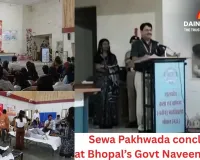Supreme Court May Refer Madhya Pradesh OBC Reservation Case to High Court
Digital Desk
.jpg)
The Supreme Court indicated on Wednesday that it may refer the contentious 27% OBC reservation case in Madhya Pradesh back to the High Court, observing that state courts better understand local demographics and circumstances. The case, which was postponed after the state government sought more time, is scheduled for a crucial hearing on Thursday.
During Wednesday's proceedings, Solicitor General Tushar Mehta, representing the Madhya Pradesh government along with Advocate General Prashant Singh, Additional Solicitor General K.M. Nataraj, and Special Counsel Advocate Shashank Ratnu, requested additional time to address technical complications in the case. The Supreme Court expressed concern that repeated delays could further complicate matters, especially with the upcoming Diwali holidays approaching.
Court Considers Interim Relief or High Court Referral
The bench suggested two potential pathways for resolving the matter: providing interim relief similar to the temporary benefits granted in Chhattisgarh, or directly referring the case back to the Madhya Pradesh High Court. The Supreme Court emphasized that reservation issues are state-specific and require understanding of local population dynamics and demographic circumstances.
"This is a state-specific reservation issue. While the Indira Sawhney judgment is relevant, the High Court has a better understanding of the local population and context," the bench observed. The court noted that state High Courts are better positioned to examine the geographical, social, and demographic conditions that justify exceeding the 50% reservation ceiling established in the landmark 1992 Mandal Commission case.
Background of the Contentious Case
The controversy stems from Madhya Pradesh's attempt to increase OBC reservation from 14% to 27%, pushing the state's total reservation quota to 73% when combined with existing SC (16%), ST (20%), and EWS (10%) quotas. This move significantly exceeds the Supreme Court's established 50% ceiling on reservations.
The state government has justified this increase by citing "extraordinary circumstances," arguing that OBCs constitute over 50% of Madhya Pradesh's population yet remain severely underrepresented in government services and educational institutions. The government submitted a comprehensive 15,000-page affidavit containing surveys, commission findings, and administrative data to support its position.
Legal and Political Implications
Varun Thakur, counsel for the OBC Mahasabha, raised concerns about the state government's repeated requests for adjournments, telling the court that such delays hinder resolution of the matter. The Supreme Court acknowledged these concerns and indicated that if the case is referred back to the High Court, all interim orders would be vacated, potentially clearing the path for immediate implementation of the 27% reservation.
The case has significant political ramifications in Madhya Pradesh, where OBCs and tribals comprise nearly half the population. Currently, under the 87:13 formula implemented in 2023, results for 87% of advertised government posts can be declared while 13% remain on hold pending the final decision.
The Supreme Court's decision on Thursday will determine whether the matter proceeds in the apex court or returns to the Madhya Pradesh High Court for detailed examination of state-specific circumstances. If the interim orders are lifted and the case is remanded, it could pave the way for immediate implementation of the enhanced OBC quota, affecting thousands of pending government recruitments across the state.
The hearing represents a crucial juncture in one of India's most significant reservation disputes, with implications extending beyond Madhya Pradesh to the broader framework of affirmative action policies nationwide.

.jpg)








.jpg)
